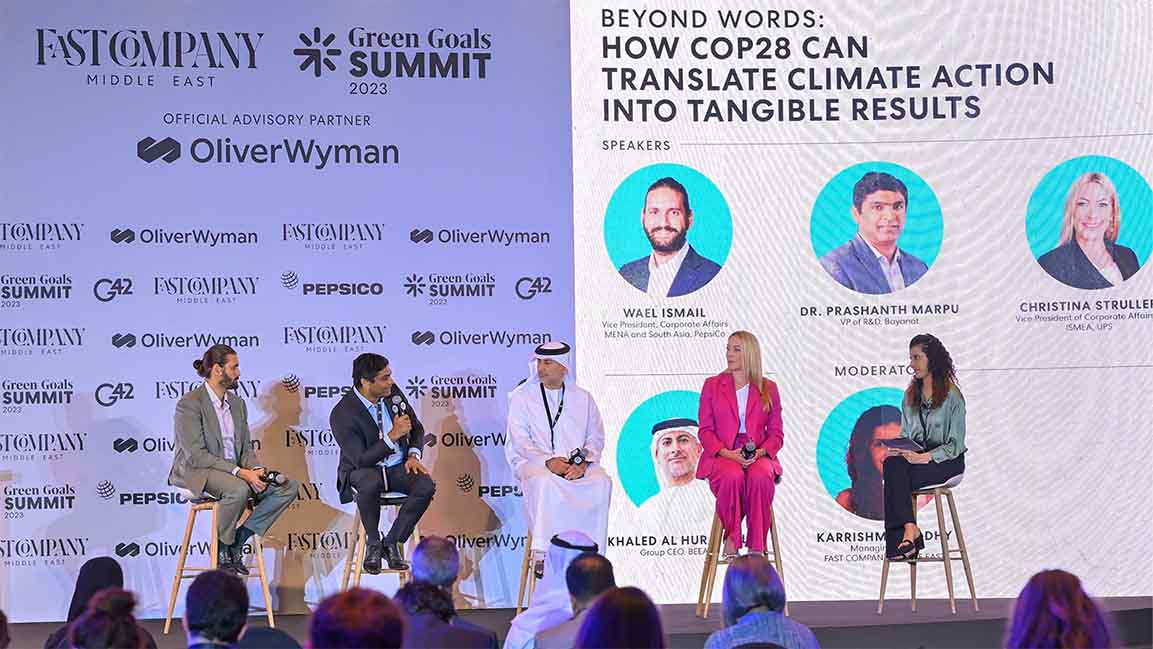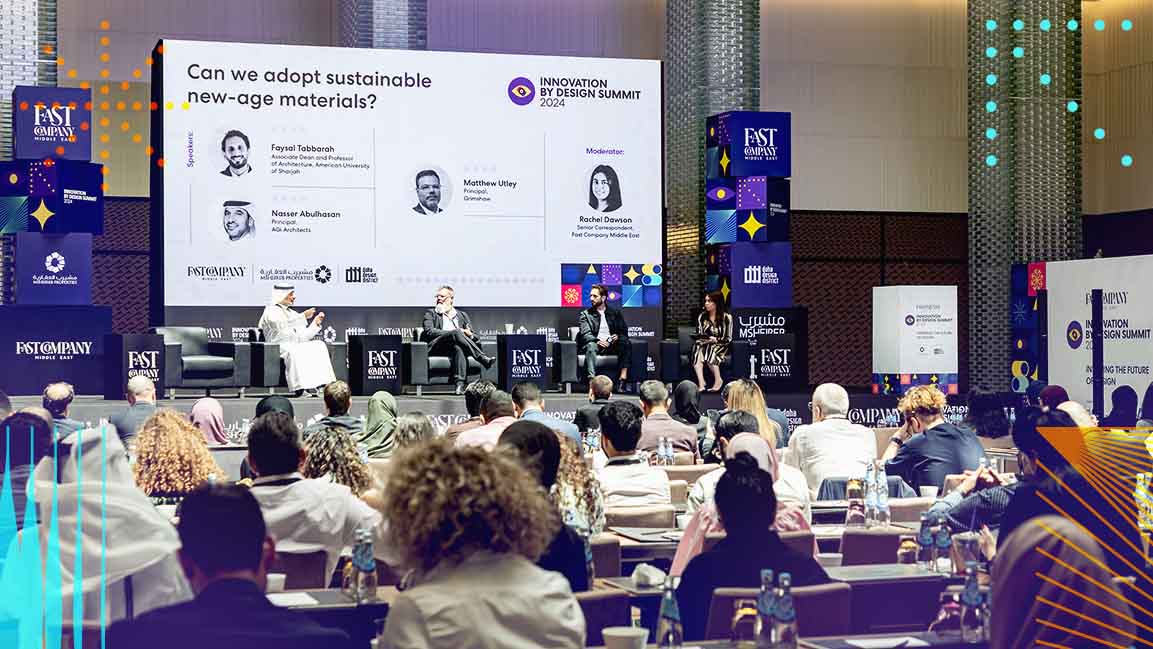- | 9:00 am
Experts at the Green Goals Summit demand bold decisions for meaningful outcomes at COP28
Experts have emphasized the importance of regulatory flexibility, uniform standards for measuring ESG goals, and public-private partnerships for a successful COP28.

Amidst mounting global environmental challenges, the UAE is gearing up to host a pivotal event of immense significance – the 28th edition of the Conference of Parties (COP28). The conference is critical in assessing progress and collectively charting a course toward a sustainable future.
During the Green Goals Summit held in Dubai, experts deliberated on the essential requirements for a successful COP28. The discussions revolved around the significance of robust policy regulations, fostering mutually beneficial partnerships, and establishing proper standards of measurement for ESG goals. These crucial factors were identified as instrumental in ensuring that COP28 yields tangible and impactful results.
Describing COP28 as a remarkable opportunity, Khaled Al Huraimel, Group CEO of BEEAH, emphasized the significance of engaging with multiple stakeholders and gaining insights into the activities of various government entities and the private sector. Al Huraimel believes that COP28 will be a crucial platform for fostering public-private partnerships, offering a valuable space for collaboration and collective action.
WATCH THE VIDEO HERE
“COP28 in the UAE will engage stakeholders and other entities who want to do something but don’t know how to. I think this is an opportunity to bring everyone together. And this is something that the UAE is always very good at doing,” he says.
Echoing the sentiments expressed by Al Huraimel, Christina Struller, Vice President of Corporate Affairs at ISMEA, UPS, shares her perspective on the significance of COP28. Struller emphasizes that this global event will be vital for fostering collaborations and partnerships. Her hopes are centered on a solution-oriented COP, specifically focusing on the world’s most vulnerable communities facing the greatest impacts of climate change. By prioritizing the needs of these communities, COP28 has the potential to address their challenges and contribute to a more resilient and sustainable future.
“I expect a vibrant and solution-driven COP to bring everyone together. It will also allow us to look at populations hardest hit by climate change. As we all know, the poorest nations make up more than 50% of the world’s population but only emit 12% of the world’s emissions.”
She adds, “If there’s political will, and if everyone comes together, it could be transformative for the global, especially regarding big ticket items. It helps us to enhance and scale up global commitments.”
DATA AND ACCOUNTABILITY OF ESG
Governments and private companies worldwide are increasingly adopting ESG goals. However, the effective implementation of these goals faces obstacles such as inadequate tracking, measurement, and accountability mechanisms. Despite the abundance of data available, the traceability of progress remains significantly limited, posing a challenge to the successful attainment of ESG objectives.
Dr. Prashanth Marpu, Vice President of R&D at Bayanat, cautions that in the absence of standardized performance measurement and despite the availability of vast amounts of data, the risk of data manipulation poses a significant obstacle to validating ESG progress. This concern highlights the need for reliable and transparent methods of assessing and verifying the advancements made in environmental, social, and governance initiatives.
“During the last few years, more and more data has been made available. Now it is possible to measure, validate, and go back and give a performance indicator on every goal we can set. But there are no standards for ESG ratings, and there is a lot of subjectiveness in measurement, allowing you to manipulate the data as you want,” he says. He hopes COP28 will be the right place for parties to come up with certain standards to measure the values of these goals in a bankable way.
“We wish to establish standards around the metrics that give a value for the performance of ESG. I hope there will be regulations for proper audits in this domain as it will go a long way in setting the path towards properly implementing all these goals,” he adds. “As Artificial Intelligence methods take center stage, more data summarization will happen. I would like to see actions happening based on real data and available bankable measurements.”
Struller further emphasizes the importance of measuring progress to clearly understand one’s current position. Without proper measurements, the ability to gauge performance and identify areas for improvement is significantly diminished.
“You have to measure where you are on the journey. It is also important for us to comply with all the international reporting standards,” she adds, “It’s important to know where we are, and it’s better to tell our customers, employees, stakeholders and investors about the same. Credibility brings transparency and helps in risk mitigation and compliance.”
STRATEGIC PARTNERSHIP FOR POLICY AND REGULATIONS
Numerous solutions and technologies already exist to reduce emissions, enhance energy efficiency, and minimize waste. However, implementing these solutions faces obstacles stemming from inflexible policies and regulations. To overcome these challenges, mutually beneficial partnerships between the government and the private sector can be crucial.
“I think it’s important to understand that each partner has a role. At PepsiCo, we have a role to play, but that won’t solve the entire value chain. So we need to understand when to partner with the governments,” says Wael Ismail, Vice President, Corporate Affairs MENA and South Asia, PepsiCo.
Additionally, he highlights that policy restrictions hinder the ability of certain companies to transition to 100% renewable energy for their manufacturing facilities, not only in the UAE but also in many other parts of the MENA region. Additionally, there have been limitations on the utilization of recycled materials.
Marpu also highlights the challenge of lengthy and outdated interim regulations. Often, the time taken to implement such regulations results in outdated policies, putting governments and partners at a disadvantage. In many cases, it appears that governments and partners are on the losing end due to the inability to adapt to rapidly changing environmental challenges and technological advancements. The absence of timely and flexible regulations hampers the effective implementation of solutions and limits the potential benefits for all stakeholders involved.
“Although regulations are needed, you need to also have the flexibility and be agile, and also look at more incentives to incentivize businesses as the market changes daily,” notes Al Huraimel.
“I wish there will be a day when governments will issue things quickly. I look forward to that day, but we must keep pushing for them,” Ismail adds.
He further emphasizes that regulations drive decisions, underscoring the significance of understanding each partner’s expertise as a key element for successful partnerships. Whether it is expertise in funding, knowledge, scalability, or consumer reach, recognizing and leveraging these strengths becomes crucial when establishing collaborative alliances.
Agreeing with Ismail, Al Huraimel underscores the necessity of partnerships for driving a better future. He highlights the transformative impact of technological advancements, which have substantially lowered the costs of implementing sustainability goals. Al Huraimel emphasizes the vital role of awareness among the private and public sectors to collectively achieve these objectives.
Throughout the discussion, experts emphasized the paramount importance of collaborative efforts, bold decision-making, and strategic partnerships for the success of COP28. By prioritizing these critical factors, COP28 promises to deliver transformative outcomes that can shape a sustainable and resilient future.








































